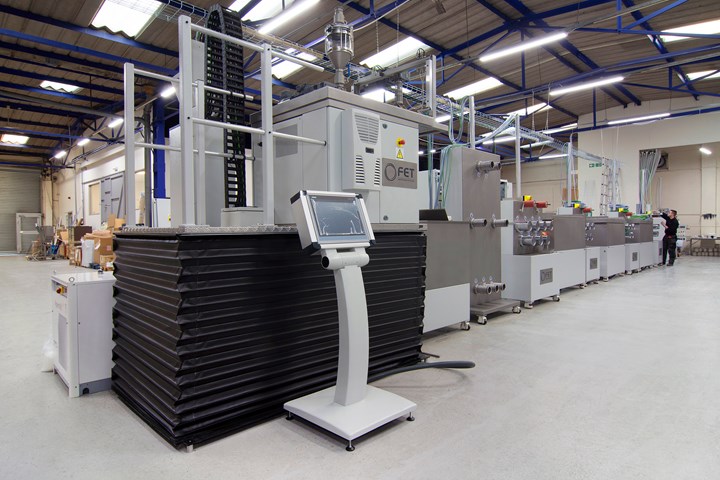Fibre Extrusion Technology FET-100 series reaches $20 million in sales
The multi-functional melt spinning system facilitates the development of precursor synthetic textile materials, as well as biodegradable composite materials.

Source | Fibre Extrusion Technology
Since its launch in 2015, Fibre Extrusion Technology Ltd (Leeds, U.K.) has taken 50 orders for the FET-100 series, with a value of more than $20 million. According to the company, this pilot and laboratory scale melt spinning system is multi-functional, allowing for easy and fast conversion between material formats and configuring to all combinations of multifilament, monofilament and melt spinning of nonwoven structures, as required.
“The FET-100 has exceeded all our expectations in terms of the sheer range of applications and markets it has reached. Systems have been shipped to 22 different countries for customers in all types of sectors, such as research and development, sports manufacturers, industrial, medical devices and educational establishments,” says managing director, Richard Slack.
The FET-100, says Fibre Extrusion Technology, has been particularly successful in the biomedical and composite sectors since its upgrade to meet the requirements in these fields. This equipment is said to be highly suitable for the development and low-volume production of exotic and difficult-to-process biomedical materials, such as resorbable polymers used in medical devices. These include the engineering polymers such as PPSU, polyetherimide (PEI), PEEK polyetheretherketone (PEEK) and PC. FET systems are also considered suitable for processing sustainable polymer types (S-Polyamides, PLA, PHA, S-PET etc.).
For composite applications, this equipment is said to facilitate the development and low-volume production of precursor synthetic textile materials used in the manufacture of high-performance composites. These include so-called “engineering polymers” such as PPSU, PEI, PEEK and PC polycarbonates. FET systems are also said to be suitable for processing sustainable polymer types (S-Polyamides, PLA, PHA, S-PET etc), ideal for the production of biodegradable composite materials.
Related Content
-
Plant tour: Collins Aerospace, Riverside, Calif., U.S. and Almere, Netherlands
Composite Tier 1’s long history, acquisition of stamped parts pioneer Dutch Thermoplastic Components, advances roadmap for growth in thermoplastic composite parts.
-
Thermoplastic composites: Cracking the horizontal body panel nut
Versatile sandwich panel technology solves decades-long exterior automotive challenge.
-
Plant tour: Daher Shap’in TechCenter and composites production plant, Saint-Aignan-de-Grandlieu, France
Co-located R&D and production advance OOA thermosets, thermoplastics, welding, recycling and digital technologies for faster processing and certification of lighter, more sustainable composites.













